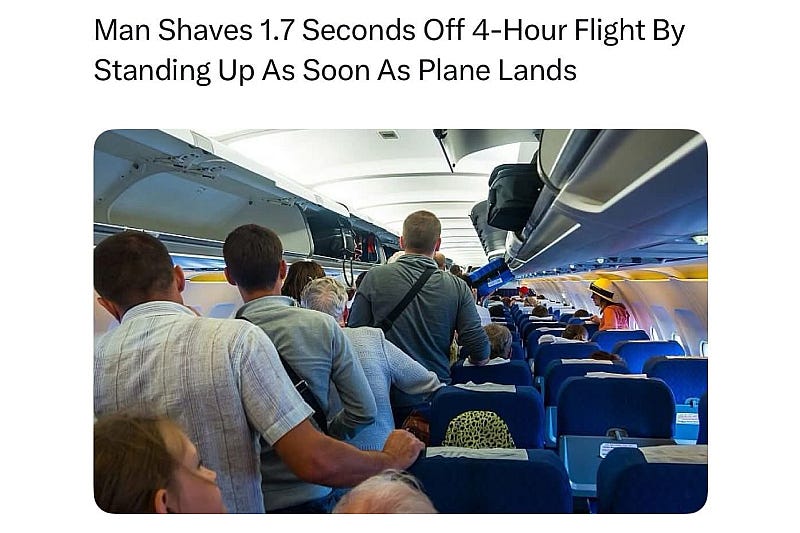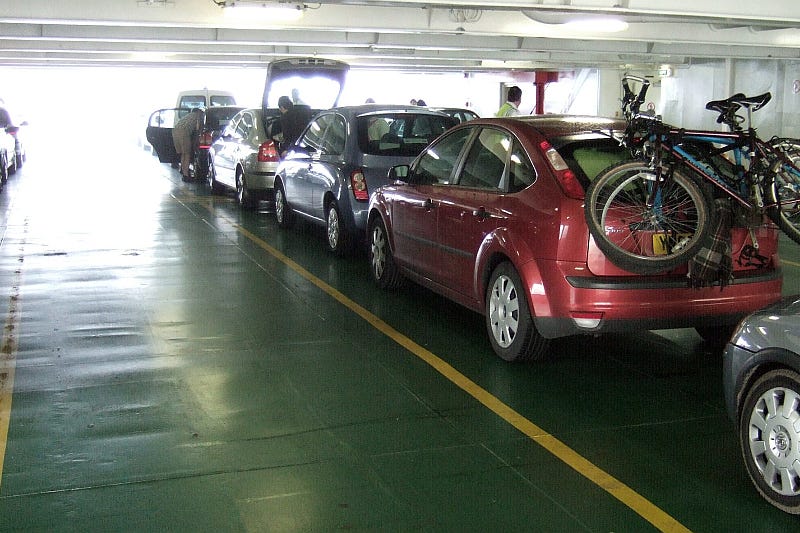Picking intuitions
Decisions to save small amounts of money or time (in absolute terms) are often guided by intuition. But are we using the right one?

The other day, a meme zoomed past on my Twitter timeline, showing a bunch of passengers standing in the aisle of an airliner that has just landed, waiting to disembark. The caption read, “Man shaves 1.7 seconds off 4-hour flight by standing up as soon as the plane lands”. Most flights have such impatient passengers, and you invariably meet them again at immigration or in the baggage collection hall. 1.7 seconds may be exaggerated, but doesn’t the insistence with which they seek to save at best a couple of minutes on a journey of several hours strike you as a bit odd?

We make many such choices to supposedly save time or money (often spending money or time to do so). Earlier this week I took a cross-channel ferry and, at the time of booking, I could pay £10 extra for ‘priority’ boarding and disembarkation. Fast boarding clearly doesn’t get you to the other side any quicker, but disembarking first could gain you up to 20 minutes on a full ferry. Supermarkets’ bonus loyalty points are another example: on top of the normal points for your spend, every week certain products can earn you additional points, equivalent to around 10% of their price. When we opt to purchase the priority option, or spend time adjusting our shopping list to maximize our bonus points, what drives us?
Intuitions galore
Certainly not ample, considered deliberation – quite the contrary. There is almost always an intuition behind it. Intuitions can produce a suitable choice fast, by focusing on a small subset of inputs, drawing on observed patterns, underlying beliefs and preferences, emotions and even cognitive biases. Most people share an aversion to wasting time, and to the impatient frequent flyer, slowcoaches towards the front collecting their belongings do just that. After a stressful day, and with a long drive home ahead, one might swap one’s usual stoic cool for an irresistible urge to jump up and stand in the aisle. The intuition that it saves time dominates the decision, irrespective of any actual gains. And it comes at a cost: a big fat dollop of frustration. Other travellers remain calmly seated, finish the cryptic crossword and wait until it is their turn to get up. Might an intuition to minimize frustration rather than wasted time be a good alternative?
One intuition regarding the priority option for the ferry is that it is a rip-off. The company incurs no extra cost: arguably a good reason to reject it. But on the other hand, disembarking can be a frustrating affair. Multiple lanes of vehicles are squeezed into two, and being stuck in the ‘wrong’ one, while left and right cars are zooming off, can be infuriating. One leg of the trip costs around £170, so the £10 extra represents about 6% – hardly ruinous, but it would still buy lunch on board. If you struggle making up your mind, there is a handy trick: reframe the situation. Imagine the fare you paid was £10 higher and included the priority option, but upon arrival at the port, you are offered a £10 refund to give up your priority entitlement. This leverages the endowment effect: we attribute a higher value to something we already have. If your hypothetical intuition is to stick with the option, get it in the real world. But what about the fundamental intuition: the guaranteed shortest disembarkation time, saving up to 20 minutes? Arriving earlier at your destination might be valuable. But don’t forget the hidden extra cost: your purchased priority option requires you to check in half an hour before the deadline for latecomers. What you gain at one end, you first sacrifice at the other.
Thanks to our supermarket’s loyalty scheme, which frequently offers bonus points for purchasing loo rolls and bin liners, we now have six months’ worth, more than enough for the next pandemic. Collecting standard points (one per pound spent) is effortless, but only offers an overall discount of 0.5% – about 50p per week or £25 per year, easy money, but an insignificant amount. To collect bonus points you must find out which products are on offer, check the present stock (we don’t want more loo rolls and bin liners!) and adjust your shopping list accordingly. About 15 minutes’ effort thus adds 400-600 points every week, equivalent to £2-3. One intuition might be not to bother: the compensation for the extra time spent is less than the minimum wage. But that is the small picture intuition. The big picture intuition tells a different story. Not only are those 15 minutes a modest part of duration of the 1.5 hours (including the drive) the weekly shop takes, they’re also spread over various activities, and cannot really be repurposed that easily. At the same time, while the weekly bonus point savings may not look all that impressive, accumulated over a whole year they add up to around £150 – definitely a nice bonus. A bigger picture tends to reduce the impact of fragmented time, and increase the impact of accumulating money.

Misguided utilitarianism
Some interesting patterns seem to emerge from these cases. Absolute gains and losses can often be compared to different references – there is often a smaller and a bigger picture. An apparent time gain can be illusory. We don’t always appreciate how different the impact of a time loss or gain is from the impact of a money loss or gain. Money has always the same value regardless how it is obtained or spent, and losses and gains are persistent and cumulative. Time is fleeting, so neither losses nor gains persist. This makes time matter more in the smaller picture, and money more in the bigger one: the 20 minutes we gain by disembarking delivers its benefit when we arrive early at our destination, and then loses all significance; the £10 we paid for it is money we will never be able to spend a second time. The degree to which either should matter depends on which picture we choose to guide us.
But perhaps we are really fooling ourselves with these utilitarian intuitions. Our predicament is not really about avoiding bad cost-benefit calculations, but about the emotions linked to control, agency and respect. The impatient airline traveller is not really trying to save a few seconds, but seeks to wrestle some control over a frustrating situation. The ferry passenger experiences a conflict between avoiding the stress of being overtaken by passengers who boarded later, and the feeling of being exploited paying for it. For bonus loyalty points collection, it’s about whether we can truly be bothered to “game the system”, not whether the ultimate gain is worth our time. What if we stopped pretending being utilitarians, and admitted to ourselves what we are paying for is psychological comfort? There is nothing wrong with that – as long as we price it honestly.



